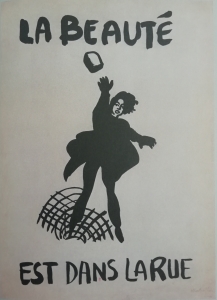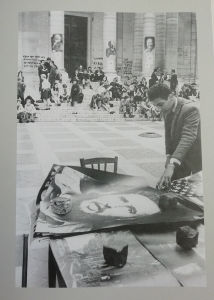
“Be realistic, ask the impossible” was one of the many slogans of the French unrest in May-June 1968. May last year was the 50th anniversary of the upheaval, which arouses mixed feelings in French society, depending on the political ideas of each individual. There was a debate in 2017 about Emmanuel Macron’s idea of celebrating May 68, when it had been an anti-governmental, non-institutionalised movement; it certainly led to many cultural events in 2018, including the BnF exhibition: The spirit(s) of May 68. Cambridge University Library purchased many of the publications on May 68 which came out around the time of the anniversary, including 1968 : de grands soirs en petits matins (C214.c.7787) and L’esprit de mai 68 (C205.d.9998). Here we highlight some of the books we have received in the past year or so.

The upheaval, which had started at the Université de Nanterre, on the outskirts on Paris, in March 1968 gained pace in May with the evacuation and occupation of the Sorbonne University and was followed by a general strike of two weeks uniting students and workers to occupy universities and factories. The authorities feared that it would get out of control and end in a wider revolution or even a civil war. Paradoxically, this unrest happened in a period of general economic prosperity, following the Second World War (“les Trente Glorieuses”), but in a society affected by rapid changes where capitalism and consumerism, government’s authority, traditional values, military interventions (in the aftermath of the Algerian war)… were questioned, but as the movement did not have a specific goal, its consequences were limited. In June 1968, De Gaulle dissolved the National Assembly and summoned French legislative elections, which gave the gaullistes a clear support, but the president continued to be unpopular. De Gaulle’s government offered some reforms, but after the failure of a referendum concerning the reform of French political system and local government, De Gaulle retired in April 1969.
The outcomes of the movement are controversial: for some, it radically changed French society, for others much less so. May 68 certainly highlighted an important division in French society. It was an event that marked a generation; the young people that participated in the protests were called soixante-huitards, and the term is also used more broadly to name the people of that generation.

Although some of its leaders claim that its origin was not political, Mai 68 was an event in which left wing student groups as workers’ unions played a crucial part. See Mai 68 et le PSU (C215.c.1796), Communistes en 1968, le grand malentendu (C215.c.2319) and May ’68 : shaping political generations (564:25.c.201.26, also available as an ebook).
May 68 challenged traditional values, and had an impact on the Catholic Church in France, in the aftermath of the Second Vatican Council (1962-1965): L’Église dans la tourmente de 1968 (C205.d.9903) and Mai 68 raconté par les catholiques (C215.c.2214). Femmes et filles : Mai 68 (C205.d.9905) covers the role of women in the movement. This was part of much bigger social changes taking place internationally, including the feminist movement and the sexual revolution.
Although May 68 started as a Parisian movement, some publications show how the events affected other cities and regions, such as Lyon, Bordeaux and Marseille: Lyon en luttes dans les années 68 : lieux et trajectoires de la contestation (C205.c.1037), Résister à la militarisation, le GARM: Lyon 1967-1984 (C205.d.9906); Marseille anées 68 (C205.d.9342) and Mai 68 à Bordeaux (C215.c.6122). Des “mai 68” dans les campagnes françaises ? les contestations paysannes dans les années 1968 (C215.c.6121) questions its influence in rural France. Le mai 68 des Caraïbes (C215.c.5347) analyses how May 68 affected the French Caribbean area. According to Mathieu Dubois, author of Les conséquences économiques de Mai 68 (C206.d.1612), the upheaval could be connected to the introduction of the common European currency, because of the desire for currency stability and increased solidarity within European countries.
May 68 had a profound impact in the French collective imagination (Le mai 68 des historiens : entre identités narratives et histoire orale, C205.c.8821; Mai 68 par celles et ceux qui l’ont vécu, C206.d.157 gathers testimonies of some of its participants), and marked a milestone in influencing aspects of French society and culture in the 20th century.

Several new publications examine the relationship between May 68, artistic creation and visual culture: the BnF’s exhibition catalogue Icônes de mai 68 : les images ont une histoire (S950.c.201.1100), Le trait 68: insubordination graphique et contestations politiques 1966-1977 (S950.c.201.1213), as well as the broader catalogues Images en lute: la culture visuelle de l’extrême-gauche en France 1968-1974 (2019.10.215) and Protest! les affiches qui ont changé le monde 1968-1973 (S950.b.201.5615). All focused on the graphic material related to the movement such as: protest posters (many created by the Atelier populaire of the École de Beaux Arts in Paris), illustrated pamphlets, iconic photographs, etc.
Other titles discuss the importance of Mai 68 in literature and film studies: Le mai 68 des écrivains : crise politique et avant-gardes littéraires (C213.c.7376), Nous sommes tous la pègre : les années 68 de Blanchot (214.c.2805), and May 68 in French fiction and film : rethinking society, rethinking representation (738:47.c.95.1346).
The movement has become emblematic and since then has been recalled by writers, intellectuals, and artists, often inspiring them. On the occasion of the 40th anniversary, the historians Phillipe Artières and Michelle Zancarini-Fournel edited 68 : une histoire collective, 1962-1981 (564:25.c.200.27) covering many aspects of May 68, including its international context.
Among recent acquisitions we have: Mai 68, le chaos peut être un chantier (C205.d.7970) by Leslie Kaplan and Mai 68, révolution par l’idée (C206.d.405) by Maurice Blanchot (see the analysis by François Hamel in Nous sommes tous la pègre : les années 68 de Blanchot, C214.c.2805). Both Kaplan and Blanchot were soixante-huitards, like Marguerite Duras, Gilles Deleuze, Henri Lefebvre… and even the 63 years old Jean-Paul Sartre. In On a raison de se révolter : l’actualité de mai 68 (C206.d.206), the philosopher Alain Badiou argues that the spirit of May 68 is still alive in contemporary France.
Manuel del Campo


I would also recommend the graphic novel La veille du grand soir: mai 68, written by (documentary) film director Patrick Rotman and illustrated by Sébastien Vassant (Paris: Seuil / Delcourt, 2018, C202.b.3612). It tells the events from both the perspective of a Sorbonne student and that of President de Gaulle’s office.
http://idiscover.lib.cam.ac.uk/permalink/f/t9gok8/44CAM_ALMA21578814630003606
https://www.editions-delcourt.fr/serie/mai-68-la-veille-du-grand-soir.html
Irene Fabry-Tehranchi